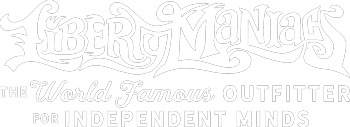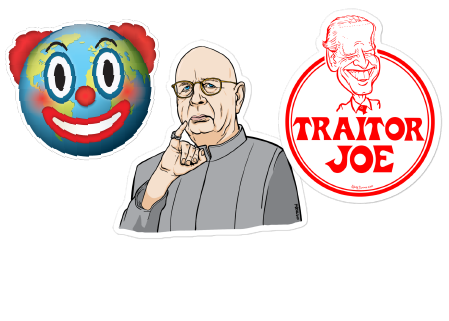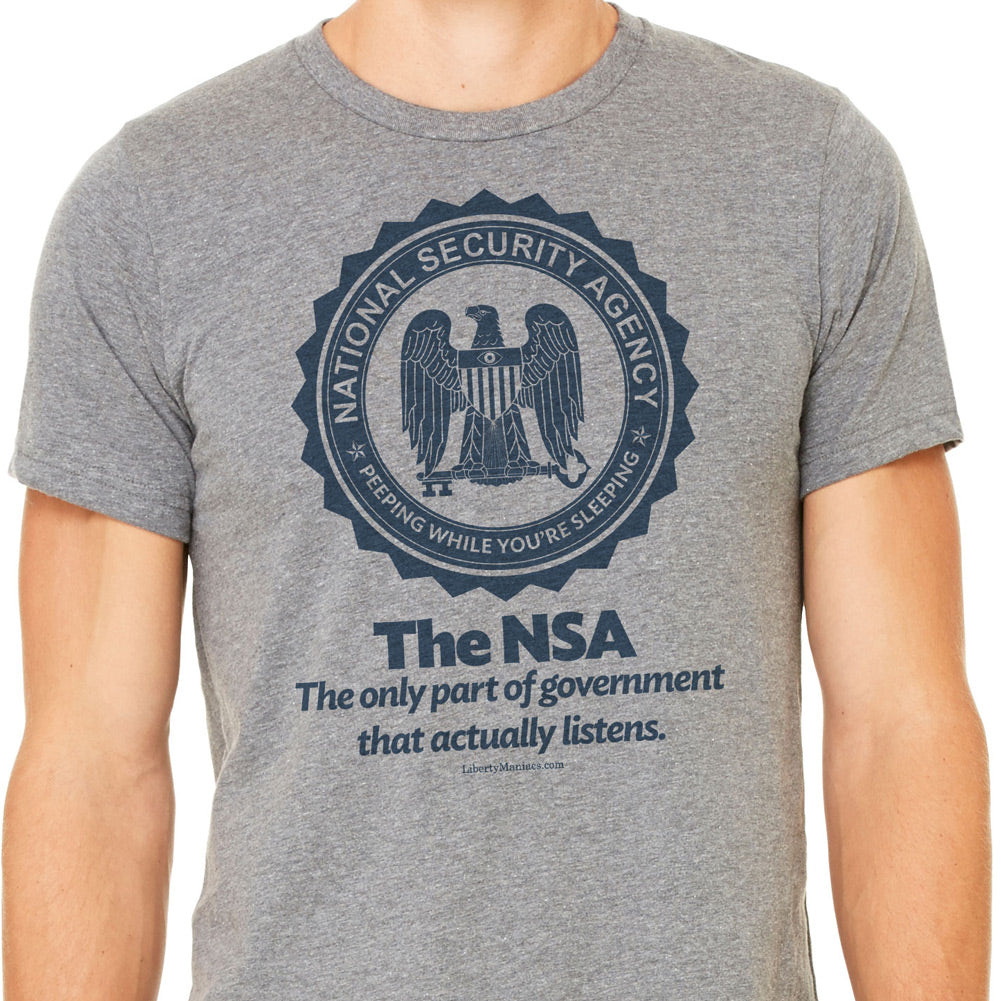Browse Categories
Add description, images, menus and links to your mega menu
A column with no settings can be used as a spacer
Link to your collections, sales and even external links
Add up to five columns
Add description, images, menus and links to your mega menu
A column with no settings can be used as a spacer
Link to your collections, sales and even external links
Add up to five columns
You’re Not a Nazi. They Just Want You to Shut Up.
March 28, 2025 7 min read

My guess is that you probably don't identify as a national socialist. Your support for free speech and the Bill of Rights doesn't exactly qualify you for an SS death's-head ring, and your thinking that the government should chill out on domestic spying doesn't mean you're the new commandant of Dachau.
But in the intellectual wasteland of modern political discourse, the most reflexive slur lobbed across the rhetorical battlefield is “Nazi.”
The label requires no evidence, no logic, and certainly no historical literacy. It only thrives on a vague sense that one’s opponent should be not just wrong, but morally radioactive.
And so the slander is sprayed liberally, hitting conservatives, libertarians, classical liberals, paleoconservatives, centrists, independents, populists, and even old-school liberals who failed to read the latest Slack message from the Ministry of Acceptable Opinions.
But as you already surely know, the most absurd and telling use of the term is aimed at ordinary people who are the opposite of ideologues, and are skeptical of government power in the first place and aren't huge fans of any politicians or political parties.
So how did we arrive at this inversion? How did the people most probably most hostile to statism become labeled as nazis, which, in the post WWII Western ethos at least, has become tantamount with malevolence greater than Satan himself?
Total State, Total Control, Full Retard
The German National Socialist Workers' Party (NSDAP), more commonly known as the Nazi Party, did not rise to power promoting personal liberty or limited government. Their ideology was defined by etatism, the belief that the state is the highest authority and the individual merely its instrument of the state.
A crucial analysis comes from Ludwig von Mises in his monumental work Omnipotent Government. Mises is not just another political economist offering opinions about the 20th century, he is arguably the most qualified person in the modern era to define what Nazism actually was. A Jewish academic from Austria who spent his life studying, critiquing, and narrowly escaping the very regime he warned Europe about, Mises offers not only unmatched scholarly rigor but also firsthand proximity to the rise of totalitarianism.
Mises described Nazism as a distinct and extreme form of etatism, a system in which the state dominates all spheres of life, reducing the individual to a functionary of state aims. He emphasized that etatism includes both socialism and interventionism—two approaches that converge in the constriction of personal liberty and centralization of authority.
Nazism, according to Mises, was not simply another version of socialist planning. It was a virulent strain of it, marked by aggressive nationalism, racial supremacy, and the doctrine of Lebensraum.
Unless you are calling for:
-
the total subjugation of private industry to government mandates,
-
the abolition of market pricing in favor of state-directed quotas,
-
the complete merger of government, media, and business into a propaganda-driven command system,
-
the use of secret police to eliminate dissent,
-
or the expansion of national territory by military conquest,
...then you're probably not a Nazi. And calling someone who simply disagrees with you about taxes or vaccine mandates one is not only insane—it's an insult to actual victims of totalitarian regimes.
Nazism: A Unique Brand of Etatism
Whereas Soviet socialism aimed to eliminate class, Nazi socialism aimed to reinforce hierarchy based on race and nation. Mises notes that this was a key distinction—both systems centralized power and abolished individual rights, but the Nazi variant was suffused with mythical nationalism and pseudo-scientific racism.
-
Extreme Nationalism and Racism: Nazi ideology revolved around Aryan supremacy and the demonization of Jews. This worldview was violently exclusionary and collectivist, in direct contradiction to any ideology that defends universal human rights, voluntary association, or peaceful pluralism.
-
Striving for Lebensraum: The belief that Germany needed to seize foreign territory to thrive was central to Nazi policy. Anyone who supports non-interventionism, diplomatic engagement, or free trade is miles away from this mindset.
-
Rejection of Enlightenment Values: Nazis viewed reason, individual liberty, and market cooperation as weaknesses to be replaced with myth, blood, and soil. Anyone who prefers open dialogue to ideological censorship already rejects one of Nazism's foundational pillars.
-
Zwangswirtschaft: While the Nazis retained nominal private ownership, entrepreneurs were mere agents of the state. The government dictated all prices, production, wages, and resource allocation. There was no real market; there was only managed compliance.
You’re Not a Nazi. But What About the People Screaming It?
Here's the real kicker: if you were to go down a checklist of actual Nazi-style policies and governing structures, you'd find more in common with today’s technocratic statists than with the people they regularly accuse of fascism.
-
Do you believe dissenters should be silenced for public safety?
-
Do you support mass censorship of media under government pressure?
-
Do you think the government should determine which industries thrive or die?
-
Do you advocate freezing bank accounts of political protestors?
-
Do you favor digital surveillance of citizens without warrants?
Because those ideas bear more resemblance to 20th-century totalitarianism than anything resembling a bumper sticker that says "Don't Tread on Me."
Likewise, the sprawling censorship-industrial complex we've seen develop in the past few years—where the federal government outsources its speech-policing to social media platforms, corporate media, and NGOs—bears a disturbing structural similarity to the propaganda machinery of totalitarian regimes. When the White House holds meetings with tech companies about which opinions to suppress or intelligence agencies ghostwrite media narratives, you are venturing into territory far more reminiscent of Zwangswirtschaft than anything proposed by liberty-minded skeptics of state power.
But here’s where it gets even more absurd: many of the loudest voices labeling others as "Nazis" today are ideological descendants of globalist, technocratic, anti-nationalist movements—precisely the kind of internationalist agenda that Nazi ideology abhorred. Open borders, race-essentialist identity politics, and supranational bureaucratic control over local populations were anathema to National Socialism.
In other words, wokesters aren’t Nazis either. Their ideas may share some authoritarian habits—censorship, central planning, the obsession with ideological purity—but they lack the ethno-nationalist, imperial, and militaristic components that were core to the Nazi worldview. Which is exactly the point: the comparison is stupid.
Calling someone a Nazi has become less about historical accuracy and more about moral panic, a way to justify authoritarian responses to dissent. It’s projection dressed up as indignation, used to dehumanize political opponents and shut down debate.
The Most Authoritative Voice on What a Nazi Is
If anyone in the modern era had the credentials to define Nazism with clarity and authority, it was Ludwig von Mises. A Jewish economist of towering intellect and one of the most rigorous critics of totalitarian systems in the 20th century, Mises didn’t merely study Nazism—he lived through its rise, understood its ideological DNA, and became a personal target of the regime.

He was a respected academic in interwar Austria and a classical liberal in the tradition of individual liberty and economic freedom. When the Nazis came to power, Mises knew exactly what that meant for someone like him: arrest, exile, or worse. He fled to Switzerland in 1934. After the Anschluss in 1938, he could never return. His Vienna apartment was ransacked by the Nazis. His personal library and academic papers were stolen. By 1940, as the Nazi grip expanded across Europe, Mises and his wife escaped to the United States with little more than their lives.
Once in America, Mises continued his mission. He joined New York University with the help of allies like Henry Hazlitt and the Volker Fund. But more importantly, he put into writing what remains the most thorough economic and philosophical diagnosis of fascism and Nazism ever published: Omnipotent Government, Socialism, and Planned Chaos.
These weren’t reactionary screeds or partisan hot takes. They were precise, lucid demolitions of the total state—crafted by a man whose work was so dangerous to National Socialism that the Nazis looted it during their conquest. Mises’s critique of Zwangswirtschaft, the Nazi economic order, was not just theoretical. He had watched the very institutions crumble and mutate into engines of domination.
So, when Mises says that Nazism was built on central planning, state control of the economy, aggressive nationalism, racial collectivism, and total suppression of dissent—he's not guessing. He’s not speculating from the bleachers of academia. He was there. He lived it. He narrowly escaped it.
That’s why his analysis carries more weight than the hashtag historians of today who throw around the word "Nazi" like it’s a trendy insult. Mises knew what it actually meant. And more importantly, he knew what it didn’t mean.
So, if you’re going to accuse your neighbor, your coworker, your political opponent—or anyone who disagrees with you—of being a Nazi, you might want to check with Mises first. Because odds are, he’d say: No, they’re not. Not even close.
Conclusion: The Real Threat
The irony is, the people most eager to paint others as Nazis often exhibit the very traits they claim to oppose:
-
The drive to centralize power
-
The desire to crush dissent
-
The willingness to distort history
-
The belief that their ideological enemies must be silenced, not reasoned with
These are not exactly libertarian impulses. They are the authoritarian instincts of those who worship power but fear debate.
In the end, when everyone becomes a Nazi, no one is. And the people who suffer most are not the slandered, but the culture itself—stripped of historical memory, allergic to nuance, and increasingly unable to distinguish between those who want to rule your life and those who simply want to be left alone.
Calling defenders of liberty "Nazis" doesn't just expose your ignorance. It reveals your contempt for truth.
And that, perhaps, is the most dangerous ideology of all.
Sources
-
Ludwig von Mises, Omnipotent Government: The Rise of the Total State and Total War. New Haven: Yale University Press, 1944.
-
Ludwig von Mises, Socialism: An Economic and Sociological Analysis. Indianapolis: Liberty Fund, 1981 (originally published 1922).
-
Ludwig von Mises, Planned Chaos. Irvington-on-Hudson: Foundation for Economic Education, 1947.
-
Ludwig von Mises, Human Action: A Treatise on Economics, Scholar's Edition. Auburn: Ludwig von Mises Institute, 1998.
-
Ludwig von Mises, Epistemological Problems of Economics. Auburn: Ludwig von Mises Institute, 2003.
-
Ralph Raico, "Classical Liberalism and the Austrian School." Auburn: Ludwig von Mises Institute, 2012.
-
Ralph Raico, The Struggle for Liberty: Essays and Speeches. Auburn: Ludwig von Mises Institute, 2010.
-
Ralph Raico, The World at War. Auburn: Ludwig von Mises Institute.
-
Murray N. Rothbard, Strictly Confidential: The Private Volker Fund Memos of Murray N. Rothbard. Auburn: Ludwig von Mises Institute, 2010.
-
Ron Paul, End the Fed. New York: Grand Central Publishing, 2009.
1 Response
Leave a comment
Also in Liberty Maniacs News

Enemies of Satire: How Liberty Maniacs Survived Censors, Lawsuits, and the Joke Police
May 01, 2025 3 min read
True tales of the most powerful agencies, politicians, and brands who tried to censor our jokes—and what happened when we fought back.

10+ Ways USAID Burns Your Tax Dollars on Pure Insanity
February 19, 2025 4 min read
USAID: where your tax dollars fund transgender operas, Taliban poppy fields, and luxury hotels for migrants—because actual humanitarian aid is so last century.

Trump’s Day-One War on the Government-Censorship Hydra
January 21, 2025 1 min read
In a move to reclaim free speech, President Trump’s latest executive order shines a spotlight on a vast web of federal meddling and Big Tech compliance. From CISA’s pivot to policing memes to hush-hush partnerships that throttled dissent, this piece dives into Washington’s creeping censorship—and asks if this crackdown can truly put an end to the digital silencing of Americans.
Recent Articles
- Enemies of Satire: How Liberty Maniacs Survived Censors, Lawsuits, and the Joke Police
- You’re Not a Nazi. They Just Want You to Shut Up.
- 10+ Ways USAID Burns Your Tax Dollars on Pure Insanity
- Trump’s Day-One War on the Government-Censorship Hydra
- The Ultimate Guide to Men's Clothing Sizing
- The Ideological Capture Behind the Woke Left's Meltdown Over Trump's 2024 Victory
- The Yuri Bezmenov Playbook: A Guide to Ideological Subversion
- 198 METHODS OF NONVIOLENT POLITICAL ACTION
- Why the 2nd Amendment is Awesome
- I Have A Nightmare
Sections You Might Like
Subscribe
Sign up to get the latest on sales, new releases and more …








Silence Dogood
September 19, 2025
You’re Not a Nazi. But What About the People Screaming It?
Here’s the real kicker: if you were to go down a checklist of actual Nazi-style policies and governing structures, you’d find more in common with today’s technocratic statists than with the people they regularly accuse of fascism.
Do you believe dissenters should be silenced for public safety? Texas SB 2972 https://capitol.texas.gov/tlodocs/89R/billtext/html/SB02972F.htm
Do you support mass censorship of media under government pressure? FCC Chair Pressure ABC on behalf of the administration https://deadline.com/2025/09/fcc-jimmy-kimmel-charlie-kirk-suspect-1236547238/
Do you think the government should determine which industries thrive or die? US GOV buys into Intel https://www.reuters.com/business/us-take-10-equity-stake-intel-trumps-latest-corporate-move-2025-08-22/
Do you advocate freezing bank accounts of political protestors? Stephen Miller “You will live in exile. Because the power of law enforcement under President Trump’s leadership will be used to find you, will be used to take away your money, to take away your power, and if you’ve broken the law, to take away your freedom.”
Do you favor digital surveillance of citizens without warrants? ICE and Flock https://www.kqed.org/news/12055606/how-ice-is-using-your-data-and-what-you-can-do-about-it